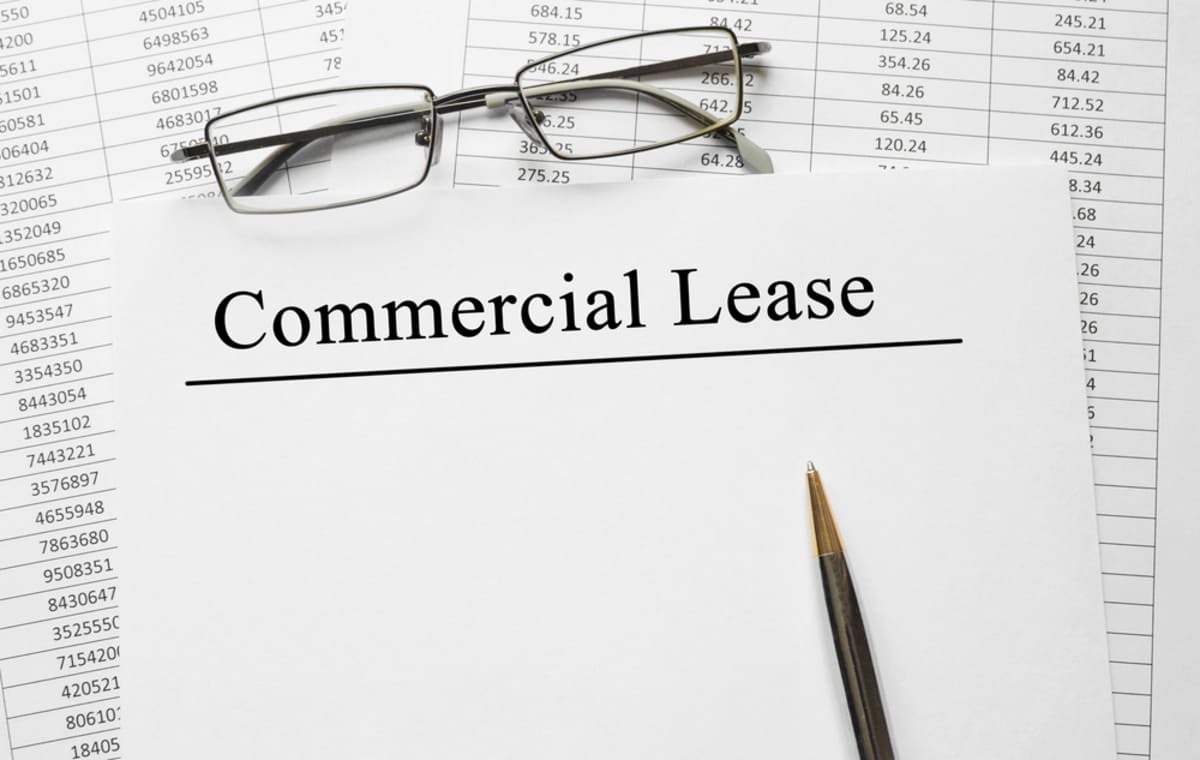Investor Resources
How to Rent a Business Property: What You Need to Know

Navigating the world of commercial leases can feel overwhelming for business owners. Choosing the space, understanding lease terms, and negotiating a deal in your best interest are all vital elements that can significantly impact your business's success.
This blog from our team at Kenwood Management Company will help you understand commercial leases, provide practical tips for negotiating, and highlight some potential pitfalls to avoid.
Whether you're a startup looking for its first office or an established business planning to expand, keep reading to make an informed decision about renting commercial space.
The Basics of Renting Business Space
Understanding your lease agreement is crucial in commercial real estate.
Before learning about the specifics of a lease, it's important to understand the various types of commercial rental spaces and some essential terms.
What Are Different Types of Leases?
Knowing your leasing options is vital in a world where every square foot counts. The three common types include a full-service or gross lease, a net lease, and a modified gross lease.
A gross lease is preferred by business owners seeking simplicity in their financial planning because all costs, like property tax and insurance, are covered within the rental fee.
A net lease, on the other hand, might offer lower base rents but require tenants to pay additional expenses such as maintenance fees or property taxes.
Lastly, there’s a compromise between these two—the modified gross lease, which splits certain costs between the tenant and the landlord while keeping others separate.
Understanding Lease Terms
The duration of a commercial lease can impact your future business plans. So, don’t overlook this detail when negotiating terms with a real estate broker or agent.
Typically, leases run for five, seven, or ten years, giving stability for both parties involved - you get guaranteed space while landlords secure steady income over time.
To give yourself greater flexibility, consider asking about short-term leases if you’re unsure about long-term commitments due to market uncertainties or evolving customer base needs at the current location.
Whether it’s office space in bustling city centers surrounded by potential clients and customers that help build a strong branding presence, or more affordable retail stores outside busy hubs, perfect for targeting online shoppers who prefer the pick-up option. There are myriad considerations worth pondering.
Finding the Right Commercial Space
Determining the appropriate commercial premises for your business is essential for its setup.
However, before you sign a lease agreement, consider these key factors.
Choosing the Perfect Location
Your business location can make or break your success.
Consider your target market—who are they? Where do they live? These questions will help guide you toward areas that align with your customer base.
You also need to think about accessibility, whether by public transport or car parking for those driving in.
Consider legal issues affecting businesses, such as zoning laws regulating occupancy and building use. Remember safety measures like checking crime reports in potential locations.
Size Matters
The square footage of your rental space needs careful consideration as well. Your business operations might fit snugly into 500 square feet now, but what about future growth plans?
A short-term lease could give greater flexibility if there's uncertainty around how much room you'll need down the line, while a longer-term lease may offer better rates for larger spaces. Long-term leases also provide better stability.
Not all leases calculate rent payments based solely on square foot measurements; some include shared common areas in their calculations, so always read the fine print before deciding.
Lease Agreements and Financial Considerations
Navigating a commercial lease can feel like a maze. Yet, understanding the fundamentals of lease agreements and financial commitments is critical to successful property investment.
Rent Calculations: Base Rent vs Operating Expenses
Your base rent refers to the monthly payment for the space itself.
However, don't forget about operating expenses—costs you'll incur on top of your base rent. These might include maintenance fees or charges for common areas in a commercial building.
A gross lease includes most operating expenses within the base rent, providing greater predictability but potentially higher upfront costs. On the other hand, with a net lease structure, tenants pay lower initial rents but cover certain additional costs such as property tax or insurance premiums.
Covering Your Assets: The Importance of Insurance Coverage
Commercial property insurance covers not only physical damage to your rental space but also protects against potential business interruptions caused by incidents such as fire or theft.
Insurance requirements vary depending on your location and type of business; however, having adequate coverage helps ensure that unexpected events won't derail your venture's success.
It's wise to ask an expert, such as our team at Kenwood Management Company, to review the type and extent of coverage most suitable for your requirements before finalizing any agreement particulars.
The Costly Consequences Of Breaking A Lease Agreement Early
Pulling out from a signed contract isn’t without consequences, especially when considering commercial leases where a long-term commitment is usually expected.
In many cases, breaking a lease could result in hefty penalties and continuing responsibility for months' rent payments until another tenant takes over.
So, read the fine print and ensure you're ready for a long-term commitment before signing that dotted line. If there are doubts or if your business model demands greater flexibility, consider opting for short-term lease options instead.
An experienced attorney can help navigate these complex considerations and ensure you make informed decisions when renting a commercial space.
How to Navigate the Lease Agreement Process
Understanding lease agreements can feel like unraveling a complex code.
However, breaking them into manageable components makes these puzzles less intimidating and more approachable.
Decoding Lease Agreements
The first step to understanding your contract is recognizing its essential elements. For instance, knowing the duration of the agreement and the renewal options.
It's also crucial to understand what would occur if either party needed out before the term ended—this refers to termination clauses.
Negotiating build-out requirements is an essential part of establishing a lease agreement.
Customizing Your Space
Rental space customization might seem exciting, but every modification has a financial obligation. So, ensure you know who foots these bills—will the tenant or the landlord pay?
What is Rent Escalation?
Rent escalation is a term often found in a commercial lease that indicates a potential increase in rent over the lease term. This could be a fixed percentage increase annually or tied to a cost-of-living index.
Understanding the terms of the rent escalation clause is essential to avoid unexpected financial burdens in the future.
Evaluating Leasehold Improvements
Leasehold improvements refer to alterations made to the rental property to tailor it to the needs of your business. These include changes to the interior layout, installing additional fixtures, or upgrading existing facilities.
It's important to clarify who is responsible for these costs and whether these improvements can be taken back at the end of the lease term.
Managing and Maximizing Your Business Space
Your business space isn't just a place to work; it's an asset that, if managed well, can contribute significantly to your company's success.
However, how do you ensure that every square foot of your rental space is used effectively?
Rental Space Maintenance: Keeping Things in Shape
First, maintaining the quality of your physical environment plays a huge role in employee productivity and customer satisfaction. Whether it’s keeping common areas clean or ensuring timely repairs, proactive maintenance can prevent other problems.
This doesn’t mean you have to do everything yourself. For instance, when dealing with complex issues like property insurance coverage or liability insurance requirements, don't hesitate to ask for professional help.
Space Utilization: More Than Just Square Feet
Square footage alone shouldn’t dictate how you use your commercial space. Think about what activities are crucial for daily operations and future growth needs.
An open floor plan might foster better collaboration among employees, while designated spaces could be helpful in specific tasks such as inventory storage or client meetings.
Fostering Long-Term Success Through Strategic Neighbors
The surrounding businesses matter as well. The right neighbors may become valuable partners over time.
Hence, having the right business neighbors is vital for long-term success.
Comparing Different Business Space Options
When considering a commercial space rental, recognize that the requirements of small businesses can vary significantly depending on their industry, customer base, and plans.
We're here to help you make sense of the different options available.
Office Spaces vs Retail Stores: What's Right for You?
The first thing to consider is whether an office or retail space suits your operation better. Office spaces offer more square footage per dollar spent, but retail stores may need to provide the visibility that they do with their prime locations, attracting walk-in traffic.
Retail stores usually rent by square foot, giving greater flexibility in choosing just how much space you need.
Negotiating Lease Structures: The Fine Print Matters
Lease agreements come in various shapes and sizes—from short-term lease contracts offering actual rental freedom to long-term leases providing stability but less mobility.
Always remember that tenant pay clauses within these agreements are negotiable—everything from months' rent upfront to who gets stuck with the property tax bill.
A smart move would be having your real estate agent review agreement details carefully because they can spot hidden costs, such as additional insurance requirements or common areas maintenance fees, that are often overlooked during negotiations.
Your Commercial Property Insurance Coverage is Required
No matter what type of commercial real estate you choose, securing adequate property insurance coverage is crucial for protecting physical assets like furniture or equipment and intangible ones, such as liability claims against accidents in your business space.
It's essential to understand what your coverage includes and excludes, as well as any requirements from landlords for additional insurance. Landlords may require you to add insurance for certain risks, so be prepared.
Even if the landlord pays some coverage, you'll still need separate property insurance.
Financial and Legal Considerations for Renting a Business Space
When considering renting a commercial property, it is vital to understand the financial commitments involved clearly. This includes monthly rent payments and ongoing insurance requirements.
Explore these aspects further to ensure you are well informed and confident in your decision.
How to Budget for Rent
Your first question might be: "How much will my monthly rent cost?" It's only sometimes straightforward as it depends on location, space size (measured in square feet), lease structure, and more.
On top of that, your landlord may ask you to pay part or all of the property tax, which could significantly impact your budget.
Inflation and other factors may necessitate rent increases over time, so it's important to factor this into your budget.
However, keep this from deterring you. With careful planning and an accurate estimate of what future business needs might look like, budgeting becomes manageable.
Navigating Insurance Requirements
Property insurance coverage protects against damages caused by fires or floods. The extent of coverage required usually varies based on different risk factors related to the actual rental premises, but adequate protection is paramount nonetheless.
After moving their operations into a new location, the last thing anyone wants is to realize they didn’t have enough coverage when disaster strikes. Let a business and commercial law attorney help you rent your next business space to ensure you're adequately covered.
Tips for a Successful Business Space Rental Experience
Leasing a commercial space can be challenging, yet with appropriate arranging and research, you'll have the option to open up in no time.
Let's discuss some essential tips.
Do Your Homework
Proper research is the first step towards a successful business space rental experience.
Understand the lease terms and agreements thoroughly before proceeding. Ask yourself, "What does 'gross lease' or 'net lease' mean?" Or "How much square footage do I need?" You must know these details before moving forward.
This also includes getting familiar with zoning laws related to your potential business location—they may affect how you can use the property.
Negotiate Terms That Work For You
Renting commercial real estate isn't just about finding an available space; it's also about negotiating favorable terms within your commercial lease agreement. These might include flexible leasing options such as short-term leases or adjustable square feet based on future business needs.
Everything from months' rent security deposit requirements to who pays for standard area maintenance could impact both current location costs and the long-term financial obligations of your small business.
Maintain Positive Landlord-Tenant Relationships
A positive relationship between landlord and tenant goes a long way in ensuring that your commercial leasing process is smooth. Open and frequent communication can help to fix potential issues before they escalate, making the entire process more manageable.
Moreover, landlords might be more willing to provide greater flexibility during lease renewals if you've established a good rapport with them.
Rent a Business Space With Kenwood Management Company
How to rent a business space can be intimidating, yet having the proper knowledge and resources makes it simpler. Remember that understanding commercial leases is crucial in making an informed decision.
At Kenwood Management Company, we pride ourselves on being more than just a property management and investment firm. We serve as trusted partners to our clients, guiding them through every step of their commercial leasing journey.
Our experienced team can help you understand complex lease terms, ensuring you get the most value out of your rental space. We have the expertise to help you negotiate favorable lease agreements, navigate insurance requirements, and manage rental space efficiently.
We understand the unique needs and challenges small businesses face and are here to ensure that leasing commercial property is a smooth and successful experience for you.
If you want to invest in a commercial space, download our ultimate guide, How to Invest in Commercial Real Estate.



